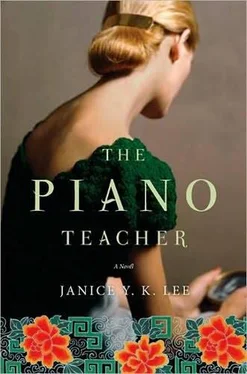“This place any good?”
“Not much to look at but currently the best seafood in town.” They had seen the tin buckets in front upon arriving, large, lazy fish swimming inside, oblivious to their fate.
“He likes Chinese food?”
“Seems to be acquiring a taste.” Her nails clatter on the table as she drums her fingers. “Dommie is late, the fool. Why does he do this all the time?”
“You eat with Dominick often?”
“Every night.”
“Why are there so many seats? Who else is coming?”
“They travel in packs, darling. He wouldn’t dream of being seen without his entire coterie of yes-men and sycophants.”
“And he is, of course, late.”
Just then, the door opens and a string of men is ushered in. It is immediately clear who Otsubo is as the others wait inside the room until he has entered, and wait for him to choose his seat.
“Otsubo-san,” Trudy says gaily, standing up. “You’re late as always.” She looks lovely tonight, dressed in a sleek tomato-red silk tunic dress, her hair swept back into a chignon.
Time to sing for supper. Will stands up.
“Very nice to meet you. I’m Will Truesdale.”
“Otsubo,” the man says gruffly, and gestures that they are all to sit. “Mr. Chan not here?”
“He’ll be here soon. It’s a difficult time to get around.” Trudy sits between Otsubo and Will.
The man is stocky and short, in a finely cut suit of tropical-weight wool. His hair is cut close, military-style, a centimeter long so the oily surface of his scalp shines through. His eyes, porcine and bulbous, sunken in a puffy, smooth face. In short, an unattractive man. Next to him, Trudy looks like a gaudy, gorgeous flamingo.
His men sit down at the table, anonymous in their multitude. They talk among themselves, but quietly, so that Otsubo needn’t talk above them. He orders Cognac.
“Otsubo’s acquiring Chinese tastes,” Trudy says. “He loves XO now.”
“Some things Chinese are good,” Otsubo says. “At least they are Asiatic.”
There is a silence.
“What should we eat?” Trudy asks into the void. “Abalone? Shark’s fin? Would you like me to do the honors?”
Otsubo nods and she orders rapidly in Cantonese. She speaks everything well-Cantonese, Shanghainese, Mandarin, French, English. Some of the men look at her as she is ordering, their faces unreadable. She must be a complete mystery to them, probably straight from the countrysides of Japan, pressed into service for their country to come to this place, where the language and customs are different, where a woman like Trudy flits around like a flamboyant butterfly. They drink beer straight from the bottles, and smoke without ceasing. They are not offered Cognac.
Dominick enters hastily.
“Otsubo-san.” He bows. “So sorry to be impolite. Urgent matters held my attention.” Will has never seen Dominick in this ruffled state.
“You are late again,” Otsubo says. “Bad manner for business and society too.”
“I know, I know. My masters at Harrow were always on me for tardiness.”
Trudy will tell him later, the Japanese love that Dominick was at the best schools in England, they want to know all the details, and that Dominick indulges them at every chance. “They hate it but they love it too. Isn’t that always the case?”
He presents a box to Otsubo. “A gesture of my appreciation for everything you’ve done for me, and for Hong Kong.”
Otsubo grunts thanks but does not receive the box. Dominick, so obviously unused to gruffness, takes a step back, recovers, and slides smoothly into a chair.
“Maybe later, then,” he says to Will, a collusive greeting that implies they are made of finer stuff than this Japanese man.
Will turns away, unwilling to be allies with Dominick, unwilling to be as stupid as he. Trudy pours more tea.
“Mr. Truesdale,” says Otsubo in English. Then he speaks through his translator.
“How are you finding the camps?” The translator is a young, slender man with spectacles. His accent is almost unnoticeable.
Will hesitates. How honest to be? “It’s livable but, unfortunately, despite the best efforts of the camp officers, there are often shortages of food and medicines and, as there are also women and children in the camp, we feel this need acutely.”
Otsubo listens and nods. He replies, “That is a shame. We will look into the matter.” The translator looks nervous.
The first dish is served. Chinese-style, it is a cold jellyfish appetizer. Will has learned from Trudy that a proper Chinese meal unfolds in a certain way. First, a cold appetizer like pig’s feet over jellyfish vermicelli; then a warm one, perhaps sesame-crusted shrimp, a shark’s fin or winter melon soup; a signature dish such as Peking duck, a meat-sweet-and-sour pork or braised beef with choi sam, a fish, a vegetable, finishing always with noodles or fried rice, depending on the region. Chinese don’t take to heavy desserts-enjoying a cold coconut-milk dish or, if especially peckish, apple dumplings fried in hot oil and then immediately crisped in ice water.
Otsubo takes the first portion, then spins the lazy Susan around to his men. Trudy pretends not to notice the slight. She serves Will and Dominick before taking her share, a minute serving of amber tentacles covered in mustard sauce.
After chewing laboriously, Otsubo speaks again.
“There are many illustrious people in the camps, are there not? Leaders of society and business?”
“I suppose there are. But we’re all reduced to the same circumstances now, really. Nobody has more than anyone else.”
“It must be curious for them to be in such a place. Quite difficult to come down so much in life.”
“I imagine it is.”
Trudy has been uncharacteristically quiet.
“Like poor Hugh,” she interjects finally. “I can’t believe that lovely man has to wash his own socks. I don’t think he’d ever made himself a ham sandwich before this.”
They eat the jellyfish. It is cold and rubbery.
Otsubo speaks again.
“And there is a man named Reggie Arbogast?” asks the translator. “A businessman? With ties to government?”
“Yes, Reggie is one of the interned.”
Otsubo looks at Will thoughtfully.
“Is he a friend of yours?” he asks through the translator.
“Friend is too strong a word. We are acquaintances but our mutual experience has made us more intimate, no doubt about it.”
“Have more drink.” The translator fills Will’s glass with whiskey.
“Thank you.” He raises his glass to Otsubo.
“Whiskey good.” The man speaks for himself, pronouncing whiskey “whysky.”
“Yes, very good.”
“Drink. Tonight you are free.”
“Not so bad.” Will holds the door open for Trudy. The evening air is crisp and clean after the smoky, warm room.
“Yes,” Trudy says. She seems happy, relieved the evening is over and her pass has not been revoked. “Better than expected.”
“He’s an interesting…”
A car stops in front of them, and a window rolls down. A pudgy hand emerges and waves Trudy in. She looks sick, then gives him a quick kiss and climbs into the car.
“I’ll see you later, darling,” she says. “Don’t wait up.”
Early in the morning, around three a.m., while he is sleeping restlessly, the door opens quietly and Trudy stealthily pads her way to the powder room. He turns on the bedside light, listens to the water running, and waits for her to come out from her ablutions. When she slides into bed, he sees the enormous yellow bruise starting to form around her left eye. Something about her demeanor warns him not to fuss.
“That’s quite a shiner you have there,” he says.
Читать дальше












